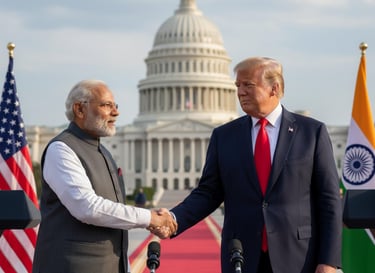PM Modi Reacts to Trump’s $1,00,000 H-1B Visa Fee Hike: ‘Our Biggest Challenge is…
In response to the U.S. administration’s sudden hike in H-1B visa fees to $1,00,000, Prime Minister Narendra Modi offered his first remarks, emphasizing India’s commitment to protecting its skilled workforce while fostering global talent mobility. Discover what PM Modi said, the implications for Indian professionals abroad, and the broader economic and diplomatic context of this unprecedented move.


By: Bharat Daily Samachar Date: 20 Sep,2025
PM Modi Responds to the H-1B Visa Fee Surge
The U.S. government recently announced a steep increase in H-1B visa fees, now set at $1,00,000 for certain applicants, sparking concerns among Indian IT professionals and students aspiring to work in America. Prime Minister Narendra Modi, in his first public comment on the matter, highlighted India’s proactive approach to safeguard its talent pool and ensure opportunities for skilled professionals globally.
During his remarks, PM Modi noted, “Our biggest challenge is not external policies, but how we prepare and empower our workforce to remain competitive and resilient in a changing global environment.” His statement reflects a focus on innovation, skill development, and strategic collaboration rather than confrontation.
Understanding the H-1B Visa Fee Hike
The H-1B visa, a key route for highly skilled foreign workers to join U.S.-based companies, has been a significant pathway for Indian IT professionals. Traditionally, H-1B visa holders have faced costs ranging from $1,500 to $3,000 in application and processing fees. The sudden increase to $1,00,000 — primarily affecting large tech companies employing multiple H-1B workers — is unprecedented.
This move is expected to impact staffing decisions for multinational corporations and may slow down the migration of Indian professionals to the United States. Many experts argue that it could encourage businesses to hire more locally in the U.S., while others see it as an opportunity for India to strengthen its domestic tech ecosystem.
PM Modi’s Perspective on India’s Talent Advantage
PM Modi emphasized that India’s greatest asset is its human capital. With millions of young professionals entering the workforce annually, India possesses a unique advantage in terms of innovation, entrepreneurship, and technology. Rather than focusing solely on challenges posed by foreign policies, the Prime Minister urged companies and professionals to adapt, upskill, and leverage India’s growing digital and startup ecosystem.
He highlighted initiatives such as Skill India, Digital India, and Make in India, which aim to enhance employability, foster innovation, and encourage global collaboration. “We must turn challenges into opportunities,” PM Modi said, stressing that India’s workforce should be prepared not only for overseas roles but also for leadership positions within the domestic market.
Implications for Indian IT Professionals
The H-1B visa fee hike has immediate implications for Indian IT professionals aspiring to work in the U.S.:
Rising Costs for Multinational Employment: Companies may reconsider hiring large numbers of foreign workers due to the added financial burden.
Greater Focus on Domestic Opportunities: Skilled professionals might increasingly explore career prospects within India, contributing to local economic growth.
Upskilling and Certification Demand: To maintain competitiveness, workers may pursue advanced certifications, cloud computing, AI, and cybersecurity skills.
Shift in Migration Trends: Students and professionals may seek alternative pathways, including countries like Canada, Australia, and European nations.
Experts suggest that while the policy could slow short-term migration, it may also drive long-term investment in India’s technology and startup sectors.
Global Reactions and Diplomatic Context
The fee increase has attracted criticism from industry groups, multinational corporations, and government officials globally. Many argue that it may discourage innovation, disrupt talent mobility, and create tensions in international trade relations.
From a diplomatic perspective, India and the U.S. maintain a strategic partnership spanning trade, defense, and technology. PM Modi’s remarks underscore a balanced approach — acknowledging the challenge while promoting collaboration and solutions that benefit both nations. India continues to advocate for fair and equitable policies that support global talent exchange.
Turning Challenges into Opportunities
PM Modi’s response reflects a forward-looking vision. Rather than framing the U.S. fee hike as a setback, he emphasized leveraging India’s domestic advantages:
Skill Development: Encouraging professionals to acquire cutting-edge skills to remain competitive worldwide.
Startup Ecosystem: Promoting entrepreneurship and innovation to create high-quality jobs domestically.
Global Collaboration: Strengthening partnerships with other nations and exploring alternative work opportunities abroad.
Technology Leadership: Investing in AI, robotics, cloud computing, and other emerging technologies to maintain India’s global edge.
By focusing on these strategic initiatives, India can mitigate the impact of international policy changes while empowering its workforce for future challenges.
Conclusion
The H-1B visa fee hike to $1,00,000 represents a major shift in U.S. immigration policy affecting Indian professionals. PM Modi’s first remarks on the issue highlight a pragmatic and proactive approach: emphasizing skill development, domestic opportunities, and global collaboration as solutions.
While the immediate impact may be felt by individuals and companies, India’s resilient workforce and innovative ecosystem are well-positioned to turn this challenge into a long-term advantage. The Prime Minister’s message is clear — India’s greatest strength lies in its people, and by preparing them for the future, the nation can thrive regardless of external policy changes.
